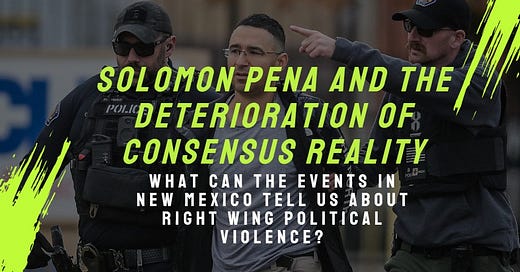Solomon Pena and the Deterioration of Consensus Reality
What can the events in New Mexico tell us about right wing political violence?
If you’d prefer an audio version of this article, please click the play button below
A former New Mexico GOP State House candidate was taken into custody on Jan. 16 with authorities alleging that he was behind a string of shootings carried out against New Mexico Democrats. Solomon Pena lost his race for the New Mexico State House in November, mustering only 26 percent of the vote. Pena refused to concede and showed up at the houses of three New Mexico Democrats with papers he alleged had evidence of a stolen election. Authorities claim that after the house calls, Pena and several others conspired to carry out attacks against their political adversaries.
Pena and his accomplices shot at the houses of two county commissioners and two state legislators this month and last. Naturally there was a break in the action from December 11th to January 3rd, because hey, even Domestic Terrorists need a little time off around the holidays to connect with family.
A quick look at Pena’s Twitter account is all it takes to see what you would expect from a violent domestic extremist in 2023: tweets about standing with Donald Trump for his 2024 Presidential bid, bousts about being present for January 6th, baseless claims about a rigged election before election day -- and that’s just in the most recent tweets. According to Time Magazine his deeper social media history is a “Greatest Hits” of far right conspiracy theories, including classics like “vaccines don’t work,” “Qanon,” and “The Deep State.”
This pattern is slowly becoming familiar in the news cycle. In September a father in Michigan who was deeply engaged with the Qanon conspiracy shot and killed his wife and nearly killed his daughter, before dying in a shootout with the police. The violence was in part fueled by fights over his fringe beliefs.
Multiple studies over the last several years have found a consistent link between belief in conspiracy theories and increased openness to committing acts of political violence. Often these conspiracy theories are used to create a sense of righteous grievance that allows an individual to see their violence as legitimate. While this pattern is not new, it is striking to see this kind of violence from a former candidate. To make matters more concerning, the number of Republicans who believe that Biden did not win the election fairly was sitting at six in ten as of September, or roughly 61% of all Republicans.
This disparity between the parties on simple things like whether or not we can trust our electoral process points to a growing divide between our shared understanding of political reality. One of the most important elements of a functioning Democracy is that the Populus can agree on a shared concept of reality. Even if they have bitter divisions about policies or how to respond to emergent problems, a consensus reality helps everyone understand that they are observing the same problems or threats. To summarize a piece written for Resilience.org, when that core concept of a shared consensus reality begins to fracture, chaos becomes increasingly likely.
In the case of Solomon Pena, that detachment from consensus reality became so great that it clouded his ability to accept that he lost his electoral bid (and not even by a close margin). Maybe it was his ego defending itself from being crushed, maybe it was just the next logical step of his radicalization.
Whatever it was, we are lucky that his gun jammed and that his accomplices didn’t kill anyone. The electorate deserves more than good luck though, they deserve candidates that don’t resort to violence when they lose, and politicians that will try to build bridges instead of gallows.
What Can I Do?
Polarization is one of the largest issues facing the United States today. Its in the news regularly in a variety of forms and has put policy makers and law enforcement on their heels. One of the organizations working to understand and combat this spread of political polarization and its impacts is the Polarization and Extremism Research and Innovation Lab (PERIL) at American University. The work they produce is helping find solutions to increasingly complex problems. You can learn more about them on their website, and connect with them on Twitter to stay up to date on their research.




